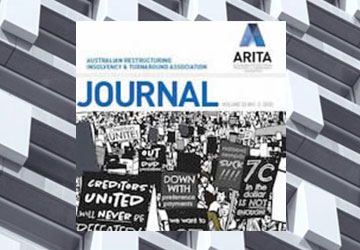Funding Post an Insolvency Event
This article has been coauthored by Siba Diqer, Investment Manager of LCM and Rebecca Hanrahan, Special Counsel of Clayton Utz.
Is a court order necessary for security interests granted after the appointment of external administrators? Perhaps not.
The requirement to register security interests under the Personal Property Securities Act 2009 (Cth) (PPSA) is not new.[1] The consequences of the failure to register, particularly post an ‘insolvency event’,[2] are well known[3] with the security vesting in the company for the benefit of creditors rather than the secured creditor.[4] But what happens when the security interest itself is created after the appointment of external administrators? Is the registration always out of time in the absence of a court order?
Historically, due to a concern that security granted to a financier post restructuring, administration or liquidation may vest, practitioners have sought relief from the court under section 588FM of the Corporations Act 2001 (Cth) (Corporations Act). However, recent cases suggest that a court order to extend the time to register may not always be required.[5] Whilst financiers and practitioners have welcomed this line of authority, there are conflicting decisions at first instance and the courts remain of the view that an order should still be sought until the position is settled.[6]
External administrators often require financing to fund working capital to allow a business to continue operations while facilitating a sale of the business as a going concern or a turnaround. Additionally, external administrators rely on funding to pursue claims for the benefit of creditors. Security is often granted in these high-risk lending scenarios and conflicting decisions on the construction of section 588FL of the Corporations Act results in a situation where security providers may be needlessly seeking relief from the court for an extension of time to register security interests created post an insolvency event. This is an administrative burden which adds to the costs of financing. The benefits of being relieved of such a requirement are to simplify debt restructuring for practitioners and save costs for creditors. Clearly, there is a need for legislative intervention to clarify the interpretation of these provisions.
On 22 September 2023, the Attorney-General announced the Australian Government’s response to the Final Report of the 2015 statutory review of the PPSA (the Whittaker Review). The Whittaker Review made 394 recommendations with an objective of simplifying the personal property securities framework.[7] The Whittaker Review recommended that section 588FL of the Corporations Act be repealed.[8] This has been rejected by the Australian Government stating that the section ‘is intended to discourage and protect against fraudulent claims prior to a company’s insolvency’. The authors are of the view that this is a welcome opportunity to address the issues raised in this publication.
Recap on the vesting provision: section 588FL
The effect of section 588FL of the Corporations Act is that a PPSA security interest granted by a company, which is not registered on the Personal Property Securities Register (PPSR) within a particular time (i.e. is unperfected at the ‘critical time’ which is defined in section 588FL(7) as the date on which the administration, winding up or restructuring is taken to have commenced), vests in that company upon an insolvency event.[9] In effect, the collateral (assets) which is the subject of the security interest vests in the grantor. A later time to register may be ordered by the court under section 588FM of the Corporations Act.[10]
The policy rationale
Section 588FL was inserted as the successor of the former section 266 of the Corporations Act. The Explanatory Memorandum to the inserting Act stated that the purpose of section 588FL is to ‘prevent security interests being granted fraudulently with knowledge of an imminent administration, liquidation or deed of company arrangement’.[11]
The court has opined that the object of section 588FL is to require timely notification of security interests via the PPSR.[12] This is achieved by providing for vesting an interest that has not followed the registration rules,[13] effectively implementing a penalty. To avoid injustice, provision is made in section 588FM for an order to immunise a security interest that has been perfected by registration by fixing a later time for registration.[14]
The current position
Currently, there are two conflicting lines of authority as to whether a section 588FM order is necessary where a security interest is both created and registered after the critical time:
- The first and earlier line of authority[15] requires a section 588FM order in every instance where a security interest is granted after an insolvency event.
- The second and more recent line of authority[16] does not necessarily require a section 588FM order where a security interest is granted after an insolvency event, as section 588FL(2) covers security interests which ‘arise’ after the critical time only if the security interest had already been ‘granted’ at or before the critical time.
The authors are of the view that, respectfully, the better and preferred approach is the second and more recent line of authority.
Recent case law
First line of authority
In K.J. Renfrey Nominees Pty Ltd (Trustee), in the matter of OneSteel Manufacturing Pty Ltd v OneSteel Manufacturing Pty Ltd (Renfrey),[17] Davies J held that section 588FL(2) of the Corporations Act covered PPSA security interests which were granted after the critical time. For this reason, whenever a PPSA security interest is granted after the critical time, it is necessary to apply to the court to extend the time for registration.
In Renfrey, the grantor (Onesteel) used equipment hired by Renfrey under a hire agreement that gave rise to a security interest. After Onesteel was placed into administration, Renfrey became aware that its security interest was not registered against Onesteel. A dispute between Onsteel, its administrators and Renfrey ensued, which was resolved once the parties agreed that they would enter a new equipment hire agreement. As part of the resolution, Onesteel and the administrators agreed to do all things necessary for Renfrey to take an effective PPSA registration.
Davies J found that the fact section 588FL(2) expressly refers to “arising after the critical time”, ‘being an expression defined by reference to the events prescribed in s 588FL(1)(a)’, was a ‘powerful textual and contextual reason’ against the ‘construction of s 588FL(1) that the “granting” of that interest must have already occurred at the time of the triggering event under subparagraph (a)’.[18] In Her Honour’s view, a ‘security interest that “arises after the critical time” is congruent to a security interest “granted” by the company after the relevant event prescribed in s 588FL(1)(a) that “is covered” by s 588FL(2)’.
This decision has been followed in Korda, in the matter of Ten Network Holdings Ltd (admins apptd) (recs and mgrs apptd);[19] Hill (admin) in the matter of Flow Systems Pty Ltd (admins apptd);[20] and Dickerson, in the matter of McWilliam’s Wines Group Ltd (admins apptd) (No 2).[21]
Second line of authority
Under the second line of authority, section 588FL(2) covers security interests which arise after the critical time only if the security interest was granted at or before the critical time. The practical effect of this construction is that there is no need for an order under section 588FM fixing a later time for the registration of security interests granted after the ‘critical time’.
In Re Antqip Hire Pty Ltd (In Liq),[22] Brereton J applied principles of statutory construction and found that the words ‘if a security interest arises after the critical time’, must refer to a security interest which had already been granted by the critical time.
In Antqip, Antqip Hire entered into voluntary administration (being the ‘critical time’) and then executed a deed of company arrangement. While in deed administration, Antqip refinanced its secured debt and granted an all-assets security interest to the incoming financier. Antqip then entered voluntary liquidation. Brereton J held that section 588FL did not invalidate the security interest granted after the critical time, consequently the incoming financier’s security interest did not vest. Accordingly, there was no need for, nor utility in, an order under s 588FM fixing a later time.
Antqip has been referred to and endorsed in Revroof Pty Ltd (recs and mgrs apptd) (admins apptd) v Taminga Street Investments Pty Ltd [23] where the court considered a section 588FM application made by receivers for securities granted several weeks after the appointment of administrators. The receivers sought orders, to the extent necessary, pursuant to section 588FM, to fix a later time for registration. It is apparent from the judgment that the receivers and the court held doubt as to the need for such an order based on the Antqip analysis.[24]
Further support for Antqip can be seen in Cathro, in the matter of Cubic Interiors NSW Pty Ltd (in liq), [25] in which the liquidator sought directions as to whether a section 588FM order was required, after the liquidator had already obtained orders pursuant to section 477(2B) approving his entry into a loan agreement and general security arrangement. This formed part of an arrangement where the liquidator paid out the senior secured creditor. The court found that there were compelling reasons for preferring the Antqip view.[26]
Compelling reasons for the second line of authority
There are many compelling reasons set out in recent authorities to adopt the latter approach, which follows the traditional concepts of statutory construction:
- The text itself favours the view that section 588FL does not apply to those interests granted after the critical time. The concepts of “grant” in section 588FL(1)(b) and “arises” in section 588FL(2)(a) are not congruent, rather they are distinct. [27] Additionally, the use of the past tense “granted” in section 588FL(1)(b) connotes a security interest that has already been granted when the insolvency event in section 588FL(1)(a) occurs. [28]
- In a practical sense, if section 588FL applied to security interests granted after the critical time, it would create an odd result in that a security interest would vest in the grantor at a time prior to the creation of the security interest.[29]
- The structure of the Corporations Act supports the view that Part 5.4B rather than section 588FL is intended to govern the granting of security after a liquidator has been appointed.[30] Section 468 of the Corporations Act already voids dispositions of property made after a court ordered winding up. [31] Further, Parts 5.3A and 5.3B govern the granting of security interests after the occurrence of an insolvency event.[32]
- In recent cases, the Court has considered that no creditor will be prejudiced in the circumstances because the security interests were granted post an insolvency event at a time when no creditors could have transacted to their detriment because of a lack of awareness of the security.[33].
The authors have not located any case where a section 588FM order was not granted in relation to the registration of a security interest in support of funding post an insolvency event, which suggests this is an unnecessary procedural requirement.[34]
What do I do now?
The second line of authority currently appears to be the favoured approach by Australian courts. It was described as ‘compelling’ in recent decisions in the Federal Court.[35] However, it is unfortunate that some decisions made after Antqip did not refer to Antqip and continued to follow the first line of authority.[36] This only adds to the uncertainty of the position.
At the date of publication, the courts have specifically stated that there remains utility in seeking a section 588FM order.[37] It is telling that the court has granted such relief by specifically including “to the extent necessary” within the orders. The application of section 588FL to security interests granted after an insolvency event does not appear to promote efficiency (either in the court process or the insolvency process itself).
At this point, the conflicting authorities remain unresolved and the first line of authority is yet to be expressly rejected by the court. This means that prudent security holders will need to apply for such relief when accepting security from a grantor post an insolvency event. This approach is required until an intermediate appellate authority resolves the competing lines of authority[38] or legislative intervention clarifies the intended construction of section 588FL. The currently proposed reform package will hopefully result in much needed change. For now, seek the section 588FM orders just in case and watch this space!
[1] The PPSA came into force on 30 January 2012.
[2] For the purpose of this article the term ‘insolvency event’ means the winding up of a company, appointment of an administrator, execution of a deed of company arrangement, appointment of a restructuring practitioner or a company making a restructuring plan.
[3] See, for example, White v Spiers Earthworks Pty Ltd [2014] WASC 139.
[4] Cathro, in the matter of Cubic Interiors NSW Pty Ltd (in liq) [2023] FCA 694.
[5] Cathro, in the matter of Cubic Interiors NSW Pty Ltd (in liq) [2023] FCA 694.
[6] Cathro, in the matter of Cubic Interiors NSW Pty Ltd (in liq) [2023] FCA 694 [86]; Revroof Pty Ltd (receivers and managers appointed) (administrators appointed) v Taminga Street Investments Pty Ltd [2023] FCA 543 [18].
[7] Australian Government Attorney-General’s Department, Government Response to the Final Report of the Statutory Review of the Personal Property Securities Act 2009 (Consultation Paper, September 2023).
[8] Recommendation 362.
[9] See section 588FL(1)(a) of the Corporations Act and footnote 2 above.
[10] See section 588FL(2)(b)(iv) of the Corporations Act.
[11] Explanatory Memorandum Personal Property Securities (Corporations and Other Amendments) Bill 2010 [6.2-6.3].
[12] Re Antqip Hire Pty Ltd (In Liq) [2021] NSWSC 1122 [70]. Cited in Cathro, in the matter of Cubic Interiors NSW Pty Ltd (in liq) [2023] FCA 694 [57].
[13] Re Antqip Hire Pty Ltd (In Liq) [2021] NSWSC 1122 [70]. Cited in Cathro, in the matter of Cubic Interiors NSW Pty Ltd (in liq) [2023] FCA 694 [57].
[14] Re Antqip Hire Pty Ltd (In Liq) [2021] NSWSC 1122 [70]. Cited in Cathro, in the matter of Cubic Interiors NSW Pty Ltd (in liq) [2023] FCA 694 [57].
[15] K.J. Renfrey Nominees Pty Ltd (Trustee), in the matter of OneSteel Manufacturing Pty Ltd v OneSteel Manufacturing Pty Ltd [2017] FCA 325.
[16] Re Antqip Hire Pty Ltd (In Liq) [2021] NSWSC 1122.
[17] [2017] FCA 325 [24].
[18] K.J. Renfrey Nominees Pty Ltd (Trustee), in the matter of OneSteel Manufacturing Pty Ltd v OneSteel Manufacturing Pty Ltd [2017] FCA 325 [20].
[19] [2017] FCA 1144.
[20] [2019] FCA 35.
[21] [2020] FCA 417.
[22] [2021] NSWSC 1122 [48].
[23] [2023] FCA 543.
[24] [2023] FCA 543 [15]-[17].
[25] [2023] FCA 694.
[26] Cathro, in the matter of Cubic Interiors NSW Pty Ltd (in liq) [2023] FCA 694 [55].
[27] Re Antqip Hire Pty Ltd (In Liq) [2021] NSWSC 1122 [47].
[28] Re Antqip Hire Pty Ltd (In Liq) [2021] NSWSC 1122 [47].
[29] Cathro, in the matter of Cubic Interiors NSW Pty Ltd (in liq) [2023] FCA 694 [56].
[30] Cathro, in the matter of Cubic Interiors NSW Pty Ltd (in liq) [2023] FCA 694 [60]-[61].
[31] Cathro, in the matter of Cubic Interiors NSW Pty Ltd (in liq) [2023] FCA 694 [60].
[32] Cathro, in the matter of Cubic Interiors NSW Pty Ltd (in liq) [2023] FCA 694 [69].
[33] Re Hutton, Caydon Flemington Pty Ltd (Recs and Mgrs Apptd) (In Liq) [2023] FCA 796 [30].
[34] Cf: cases such as Kaizen Global Investments Ltd, in the matter of Australia New Agribusiness & Chemical Group Limited (in liq) v Australia New Agribusiness & Chemical Group Ltd (in liq) [2017] FCA 431, where a section 588FM order was not made and the security interest was granted prior to the administration.
[35] Re Hutton, Caydon Flemington Pty Ltd (Recs and Mgrs Apptd) (In Liq) [2023] FCA 796 [27], Cathro, in the matter of Cubic Interiors NSW Pty Ltd (in liq) [2023] FCA 694 [55], and Revroof Pty Ltd (receivers and managers appointed) (administrators appointed) v Taminga Street Investments Pty Ltd [2023] FCA 543 [17].
[36] Park (Administrator), in the matter of Ellume Limited (Administrators Appointed) v Evangayle Pty Ltd (Trustee) [2022] FCA 1102 and Birch, in the matter of Geelong Fire Services Pty Ltd (Administrators Appointed) [2022] FCA 963 [28].
[37] Cathro, in the matter of Cubic Interiors NSW Pty Ltd (in liq) [2023] FCA 694 [86]; Revroof Pty Ltd (receivers and managers appointed) (administrators appointed) v Taminga Street Investments Pty Ltd [2023] FCA 543 [18].
[38] Re Hutton, Caydon Flemington Pty Ltd (Recs and Mgrs Apptd) (In Liq) [2023] FCA 796 [27]; Revroof Pty Ltd (receivers and managers appointed) (administrators appointed) v Taminga Street Investments Pty Ltd [2023] FCA 543 (at [18]).




